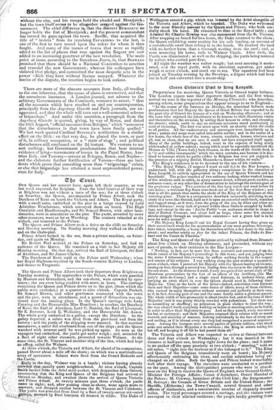be eourt.
OUR Queen and her consort have again left their country, as was last week expected, for Belgium. Even the brief interval of their stay at Brighton was not without a taste of the sea; for at three o'clock on Saturday, the Queen, accompanied by Prince Albert, took the Dutchess of Kent on board the Victoria and Albert. The Royal party, -with a small suite, embarked at the pier in a barge steered by Lord Adolphus Fitzelarence, which conveyed them on board. The High Constable and Headboroughs, and Sir Samuel Brown, with other func- tionaries, were in attendance on the pier. The yacht, attended by some other steamers, went as far as Worthing. The cruisers relanded at six o'clock, and returned to the Palace.
The Queen and Prince Albert took a drive on the cliffs on Saturday and Monday morning. On Sunday morning they walked on the cliffs and on the chain-pier.
Prince Albert bathed in the sea, from a private machine, on Satur- day, and again on Monday. Sir Robert Peel arrived at the Palace on Saturday, and had an audience of the Queen. He remained on a visit to her Majesty till Monday morning. On that day, arrived the Earl of Liverpool, the Earl of Aberdeen, and Sir James Clarke. The Dutchess of Kent staid at the Palace until Wednesday; when her Royal Highness repaired by the South-western Railway to London, and thence to Frogmore.
The Queen and Prince Albert took their departure from Brighton on Tuesday morning. The approaches to the Palace, which were guarded by Hussars and Grenadiers, and the sea-shore, were crowded by spec- tators; the sea even being studded with more, in boats. The carriage containing the Queen and Prince drove on to the pier, (from which the public were excluded,) at a quarter to nine o'clock. Captain Peahen, Sir Samuel Brown, and other gentlemen connected with the town and the pier, were in attendance, and a guard of Grenadiers was sta- tioned near the landing place. In the Queen's carriage rode Lady Canning and the Honourable Miss Hamilton ; in another, the Dutchess of Kent, the Earl of Aberdeen, Lord C. Dundas, the Earl of Liverpool, Sir E. Bowater, Lord E. Wellesley, and the Honourable Mr. Anson. The whole party embarked in a galley, except the Dutchess. As the galley departed, a salute was fired from the pier-head and from the battery ; and the yards of the shipping were manned. In that nautical manoteavre, a sailor fell overboard from one of the ships; and the Queen watched with interest until he was picked up again. As soon as the voyagers had embarked, the yacht got under weigh ; and, attended by a fleet of eight other steamers, proceeded towards Widmer. At the same time, the St. Vincent and another ship of the line, which had kept an offing, sailed for Weimer. At three o'clock, the Victoria and Albert, far ahead of its companions, passed Dover about a mile off the shore; on which was a multitudinous 'array of spectators. Salutes were fired from the Grand Redoubt and the Castle.
A'i in the day, Widmer was in a bustle; visiters having already crosdeWl1LuUaUy quiet neighbourhood. At nine o'clock, Captain SmithelaudecllrbM the Arid wail. packet, with despatches fruits Ostend, /- announcing that the King and Queen of the Belgians had arrived at . Ostend on Motaley, and awaited there the arrival of Queen Victoria and. Prince Albert: At twenty minutes past three o'clock, the yacht
- came in sight iind, after passing close in-shore, went again more to
leeward, and _cfropp. ed anchor between the St. Vincent and Caledonia. .411, yacht was4ittended from Peal by a fleet of twenty-seven six-oared aliadtpOlejirtOT_12,14 by Peal 1?(AirdlC41 aU dressed in whjçe. 'Pie Pt* of , Wellington entered a gig, which was loaning by the Arid alongside of the Victoria and Albert, which be baotded. The Duke was welcomed in the most friendly manner by the tligarrand Prince, who both cor- dially shook his hand. He remained to dine at the Royal table ; and Admiral Sir Charles Rowley was also summoned from the St. Vincent. After stopping on board for two hours, the Duke returned to the shore; the Queen exhibiting some anxiety for his safe landing, on account of a considerable swell then rolling in to the beach. He reached the land with no further harm than a thorough wetting from the surf; and, at once mounting his horse, rode to Widmer Castle. After dark, the Castle was illuminated ; as well as the shipping, the yards being manned by sailors who carried port-fires. All night the weather was rather rough; hut next morning it mode- rated, and the royal yacht, with its attendant squadron, got under weigh at seven o'clock, and stood out to sea. The squadron had been- joined on Tuesday evening by the Penelope, a frigate which had been cut in half and converted into a steam-ship.


























 Previous page
Previous page